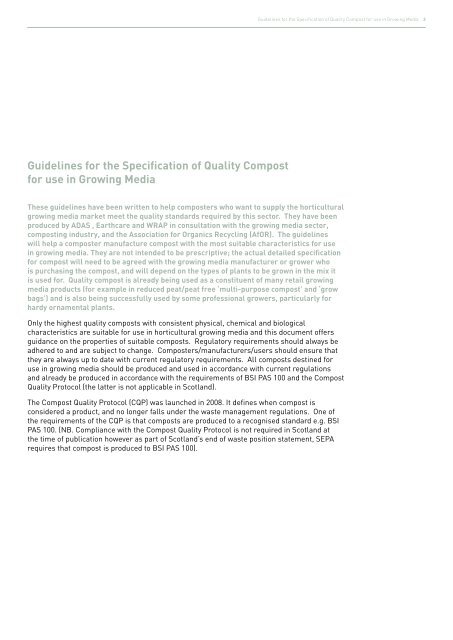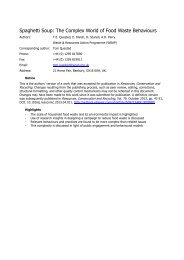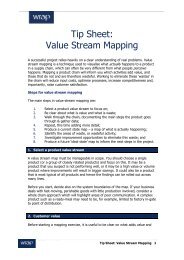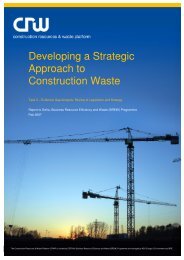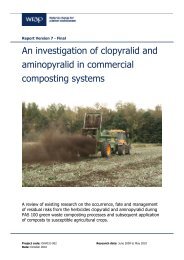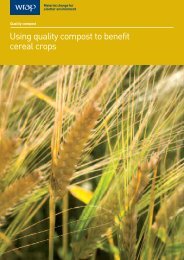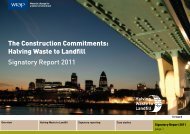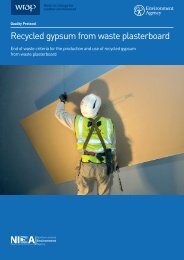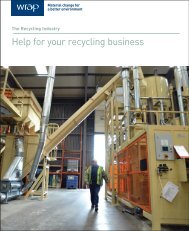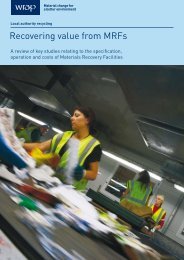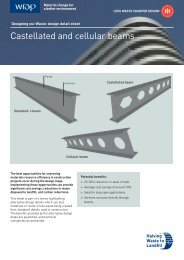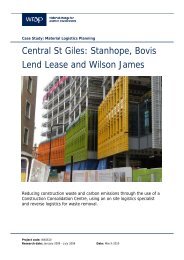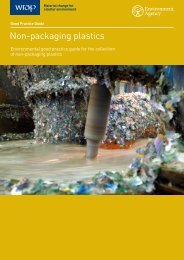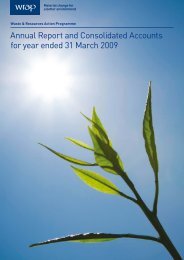Guidelines for the Specification of Quality Compost for use in ... - Wrap
Guidelines for the Specification of Quality Compost for use in ... - Wrap
Guidelines for the Specification of Quality Compost for use in ... - Wrap
Create successful ePaper yourself
Turn your PDF publications into a flip-book with our unique Google optimized e-Paper software.
<strong>Guidel<strong>in</strong>es</strong> <strong>for</strong> <strong>the</strong> <strong>Specification</strong> <strong>of</strong> <strong>Quality</strong> <strong>Compost</strong> <strong>for</strong> <strong>use</strong> <strong>in</strong> Grow<strong>in</strong>g Media 3<br />
<strong>Guidel<strong>in</strong>es</strong> <strong>for</strong> <strong>the</strong> <strong>Specification</strong> <strong>of</strong> <strong>Quality</strong> <strong>Compost</strong><br />
<strong>for</strong> <strong>use</strong> <strong>in</strong> Grow<strong>in</strong>g Media<br />
These guidel<strong>in</strong>es have been written to help composters who want to supply <strong>the</strong> horticultural<br />
grow<strong>in</strong>g media market meet <strong>the</strong> quality standards required by this sector. They have been<br />
produced by ADAS , Earthcare and WRAP <strong>in</strong> consultation with <strong>the</strong> grow<strong>in</strong>g media sector,<br />
compost<strong>in</strong>g <strong>in</strong>dustry, and <strong>the</strong> Association <strong>for</strong> Organics Recycl<strong>in</strong>g (AfOR). The guidel<strong>in</strong>es<br />
will help a composter manufacture compost with <strong>the</strong> most suitable characteristics <strong>for</strong> <strong>use</strong><br />
<strong>in</strong> grow<strong>in</strong>g media. They are not <strong>in</strong>tended to be prescriptive; <strong>the</strong> actual detailed specification<br />
<strong>for</strong> compost will need to be agreed with <strong>the</strong> grow<strong>in</strong>g media manufacturer or grower who<br />
is purchas<strong>in</strong>g <strong>the</strong> compost, and will depend on <strong>the</strong> types <strong>of</strong> plants to be grown <strong>in</strong> <strong>the</strong> mix it<br />
is <strong>use</strong>d <strong>for</strong>. <strong>Quality</strong> compost is already be<strong>in</strong>g <strong>use</strong>d as a constituent <strong>of</strong> many retail grow<strong>in</strong>g<br />
media products (<strong>for</strong> example <strong>in</strong> reduced peat/peat free ‘multi-purpose compost’ and ‘grow<br />
bags’) and is also be<strong>in</strong>g successfully <strong>use</strong>d by some pr<strong>of</strong>essional growers, particularly <strong>for</strong><br />
hardy ornamental plants.<br />
Only <strong>the</strong> highest quality composts with consistent physical, chemical and biological<br />
characteristics are suitable <strong>for</strong> <strong>use</strong> <strong>in</strong> horticultural grow<strong>in</strong>g media and this document <strong>of</strong>fers<br />
guidance on <strong>the</strong> properties <strong>of</strong> suitable composts. Regulatory requirements should always be<br />
adhered to and are subject to change. <strong>Compost</strong>ers/manufacturers/<strong>use</strong>rs should ensure that<br />
<strong>the</strong>y are always up to date with current regulatory requirements. All composts dest<strong>in</strong>ed <strong>for</strong><br />
<strong>use</strong> <strong>in</strong> grow<strong>in</strong>g media should be produced and <strong>use</strong>d <strong>in</strong> accordance with current regulations<br />
and already be produced <strong>in</strong> accordance with <strong>the</strong> requirements <strong>of</strong> BSI PAS 100 and <strong>the</strong> <strong>Compost</strong><br />
<strong>Quality</strong> Protocol (<strong>the</strong> latter is not applicable <strong>in</strong> Scotland).<br />
The <strong>Compost</strong> <strong>Quality</strong> Protocol (CQP) was launched <strong>in</strong> 2008. It def<strong>in</strong>es when compost is<br />
considered a product, and no longer falls under <strong>the</strong> waste management regulations. One <strong>of</strong><br />
<strong>the</strong> requirements <strong>of</strong> <strong>the</strong> CQP is that composts are produced to a recognised standard e.g. BSI<br />
PAS 100. (NB. Compliance with <strong>the</strong> <strong>Compost</strong> <strong>Quality</strong> Protocol is not required <strong>in</strong> Scotland at<br />
<strong>the</strong> time <strong>of</strong> publication however as part <strong>of</strong> Scotland’s end <strong>of</strong> waste position statement, SEPA<br />
requires that compost is produced to BSI PAS 100).


